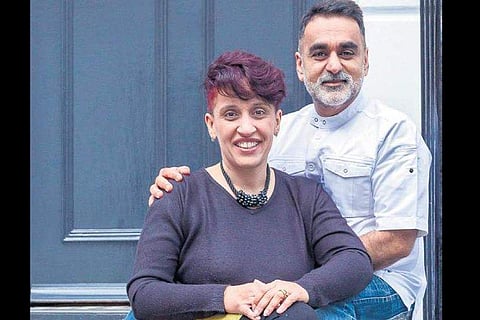

Chef Vineet Bhatia can put adjectives to shame when one starts to write about the panache with which he gets creative with traditional Indian cuisine.
Extremely soft-spoken, he lets his food – as quirky as the glasses and hats he wears, speak the loudest.
While visiting India for the Indian Hospitality Expo, with wife Rashima, who shares not only his work but also passion for food, and is a complete contrast – boisterous and gregarious like Punjabis are, he caught up with The Morning Standard. Excerpts from a tete-a-tete with the couple:
You have been working on progressive Indian cuisine for the past many years now. What is Chef Vineet’s version of modern Indian food?
VB: The way I look at it is more of a modern evolved Indian food than anything else. Progress is fine, but evolving is a constant process. You are taking things around you and creating something new, at the same time keeping your roots intact. A lot of people do progressive Indian cuisine but do not understand the classic foundations or basics. When your fundamentals are not clear, the end result is very ill-conceived. Moreover, when you travel, you realise that that there is a lot more depth in the cuisine and not just based on Punjabi or Mughlai or Lucknowi.
Has your work with Indian food changed its perception globally that it is not only about dal makhni and butter chicken?
VB: There has been an impressive a shift. We were the pioneers on the forefront, mavericks in Indian cuisine to have broken the mould in many ways. We had to push it initially, but there’s a lot more happening by many Indian chefs overseas and here in India. Respect for Indian food has increased. It is now accepted as a mainstream cuisine around the world. People now associated not just with only filling the stomachs, but also fine dining.
Modern Indian food is often characterised by gimmick – smoke, nitro et al.
RB: Our food steers clear of fancy gimmicks. We are progressive in visual presentation, portion control, and dietary habits that fit into today’s lifestyle because we are not doing physically exhaustive work. How do you interpret your basics, your classics in today’s world is what Vineet’s food is all about, deducing biryanis, sheermals, kormas, chaamp according to his own touch and understanding. I would say he is very much evolved for his cuisine. Moreover, his travels expose him to different cooking techniques and ingredients that are not available in India. Then he thinks of an Indian way to cook them.
Talking about products that are essentially not Indian and then cooking it the Indian way...
VB: The proteins, vegetables and meat that you get overseas are a lot different from what you get here. For instance, we do not get foie gras here so when we are doing it, we treat it like kaleji (liver) – use the same spices, and it tastes exactly like kaleji. So no matter what terra we cook at – Geneva, Saudi Arabia, Mauritius using local produce, the heart and soul is Indian – the masalas, the blends, the cooking techniques and styles remains classically Indian.
RB: His passion is to spread Indian food, and he uses local ingredients of that region to familiarise local people who do not happen to be Indians, with what our food is all about.
For instance, introducing them to, for example, cumin. We tell them to make soup as they do but tamper it with cumin as a finish touch.